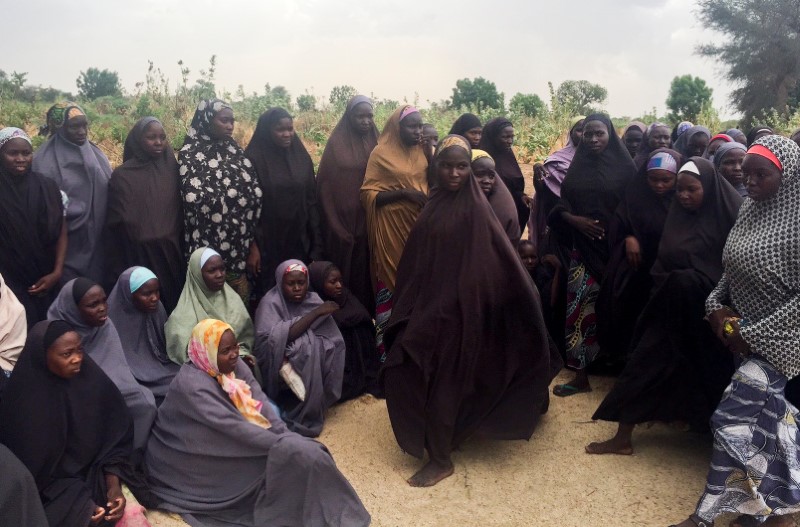
By Felix Onuah and Ahmed Kingimi
ABUJA/MAIDUGURI, Nigeria (Reuters) – Boko Haram militants have released 82 schoolgirls out of a group of more than 200 whom they kidnapped from the northeastern town of Chibok three years ago in exchange for prisoners, the presidency said on Saturday.
Around 270 girls were kidnapped in April 2014 by the Islamist militant group, which has killed 15,000 people and displaced more than two million during a seven-year insurgency aimed at creating an Islamic caliphate in northeastern Nigeria.
Dozens escaped in the initial melee, but more than 200 remained missing for more than two years.
Nigeria thanked Switzerland and the International Committee of the Red Cross for helping secure the release of the 82 girls after “lengthy negotiations”, the presidency said in a statement.
President Muhammadu Buhari will receive the girls on Sunday afternoon in the capital Abuja, it said, without saying how many Boko Haram suspects had been exchanged or disclosing other details.
A military source said the girls were brought on Sunday morning from Banki near the Cameroon border to Maiduguri, the capital of Borno state where the insurgency started.
The release of the girls may give a boost to Buhari who has hardly appeared in public since returning from Britain in March for treatment of an unspecified illness.
He made crushing the insurgency a pillar of his election campaign in 2015.
The army has retaken most of the territory initially lost to the militants but attacks and suicide bombings by the group have made it nearly impossible for displaced persons to return to their recaptured hometowns.
“The President directed the security agencies to continue in earnest until all the Chibok girls have been released and reunited with their families,” the presidency said.
INSECURITY
More than 20 girls were released last October in a deal brokered by the International Committee of the Red Cross. Others have escaped or been rescued, but 195 were believed to be still in captivity.
Buhari said last month that the government was in talks to secure the release of the remaining captives.
Although the Chibok girls are the most high-profile case, Boko Haram has kidnapped thousands of adults and children, many of whose cases have been neglected.
Although the army has retaken much of the territory initially lost to Boko Haram, large parts of the northeast, particularly in Borno state, remain under threat from the militants. Suicide bombings and gun attacks have increased in the region since the end of the rainy season late last year.
Some 4.7 million people in northeast Nigeria depend on food aid, some of which is blocked by militant attacks, some held up by a lack of funding and some, diplomats say, stolen before it can reach those in need.
Millions of Nigerians may soon be in peril if the situation deteriorates, as authorities expect, when the five-month rainy season begins in May and makes farming impossible in areas that are now accessible.
This part of Nigeria is the western edge of an arc of hunger stretching across the breadth of Africa through South Sudan, Somalia and into Yemen on the Arabian peninsula. The United Nations believes as many as 20 million people are in danger in what could become the world’s worst famine for decades.
(Additional reporting by Tife Owolabi and Ulf Laessing; editing by Angus MacSwan and Jason Neely)





